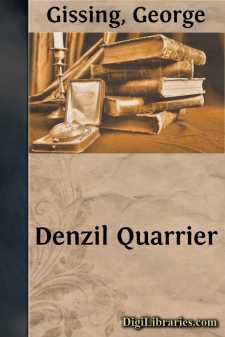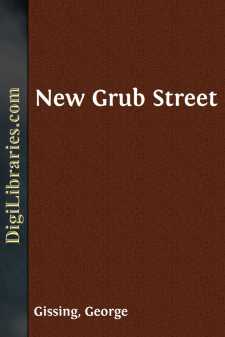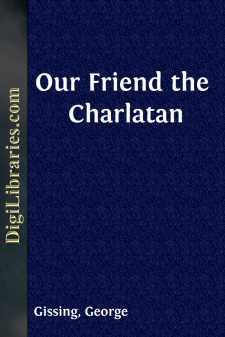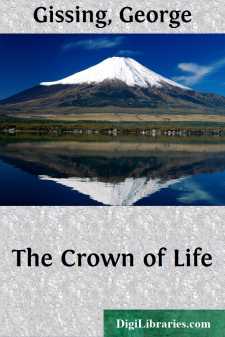Categories
- Antiques & Collectibles 13
- Architecture 36
- Art 48
- Bibles 22
- Biography & Autobiography 813
- Body, Mind & Spirit 142
- Business & Economics 28
- Children's Books 17
- Children's Fiction 14
- Computers 4
- Cooking 94
- Crafts & Hobbies 4
- Drama 346
- Education 46
- Family & Relationships 57
- Fiction 11829
- Games 19
- Gardening 17
- Health & Fitness 34
- History 1377
- House & Home 1
- Humor 147
- Juvenile Fiction 1873
- Juvenile Nonfiction 202
- Language Arts & Disciplines 88
- Law 16
- Literary Collections 686
- Literary Criticism 179
- Mathematics 13
- Medical 41
- Music 40
- Nature 179
- Non-Classifiable 1768
- Performing Arts 7
- Periodicals 1453
- Philosophy 64
- Photography 2
- Poetry 896
- Political Science 203
- Psychology 42
- Reference 154
- Religion 513
- Science 126
- Self-Help 84
- Social Science 81
- Sports & Recreation 34
- Study Aids 3
- Technology & Engineering 59
- Transportation 23
- Travel 463
- True Crime 29
George Gissing
George Gissing (1857-1903) was an English novelist known for his works depicting the harsh realities of lower-middle-class life in late Victorian society. His most notable novels include "New Grub Street" and "The Odd Women," which critically examine the struggles and moral dilemmas faced by writers and women, respectively. Gissing's detailed and often bleak portrayals of urban poverty and social issues have earned him recognition as a significant figure in English literature.
Author's Books:
Sort by:
by:
George Gissing
CHAPTER I Wilfrid Athel went down invalided a few days after the beginning of Trinity term. The event was not unanticipated. At Christmas it had been clear enough that he was overtaxing himself; his father remarked on the fact with anxiety, and urged moderation, his own peculiar virtue. Wilfrid, whose battle with circumstances was all before him, declined to believe that the body was anything but the...
more...
by:
George Gissing
CHAPTER I The summer day in 1874 which closed the annual session of Whitelaw College was marked by a special ceremony, preceding the wonted distribution of academic rewards. At eleven in the morning (just as a heavy shower fell from the smoke-canopy above the roaring streets) the municipal authorities, educational dignitaries, and prominent burgesses of Kingsmill assembled on an open space before the...
more...
by:
George Gissing
CHAPTER I This is the third day of sirocco, heavy-clouded, sunless. All the colour has gone out of Naples; the streets are dusty and stifling. I long for the mountains and the sea. To-morrow I shall leave by the Messina boat, which calls at Paola. It is now more than a twelvemonth since I began to think of Paola, and an image of the place has grown in my mind. I picture a little marina; a yellowish...
more...
by:
George Gissing
CHAPTER I Stanbury Hill, remote but two hours' walk from a region blasted with mine and factory and furnace, shelters with its western slope a fair green valley, a land of meadows and orchard, untouched by poisonous breath. At its foot lies the village of Wanley. The opposite side of the hollow is clad with native wood, skirting for more than a mile the bank of a shallow stream, a tributary of the...
more...
by:
George Gissing
CHAPTER I For half an hour there had been perfect silence in the room. The cat upon the hearthrug slept profoundly; the fire was sunk to a still red glow; the cold light of the autumn afternoon thickened into dusk. Lilian seemed to be reading. She sat on a footstool, her arm resting on the seat of a basket-chair, which supported a large open volume. But her hand was never raised to turn a page, and it...
more...
by:
George Gissing
CHAPTER I On the station platform at Dudley Port, in the dusk of a February afternoon, half-a-dozen people waited for the train to Birmingham. A south-west wind had loaded the air with moisture, which dripped at moments, thinly and sluggishly, from a featureless sky. The lamps, just lighted, cast upon wet wood and metal a pale yellow shimmer; voices sounded with peculiar clearness; so did the rumble of...
more...
by:
George Gissing
CHAPTER 1 At eight o'clock on Sunday morning, Arthur Peachey unlocked his front door, and quietly went forth. He had not ventured to ask that early breakfast should be prepared for him. Enough that he was leaving home for a summer holiday—the first he had allowed himself since his marriage three years ago. It was a house in De Crespigny Park; unattached, double-fronted, with half-sunk basement,...
more...
by:
George Gissing
CHAPTER I. A MAN OF HIS DAY As the Milvains sat down to breakfast the clock of Wattleborough parish church struck eight; it was two miles away, but the strokes were borne very distinctly on the west wind this autumn morning. Jasper, listening before he cracked an egg, remarked with cheerfulness: 'There's a man being hanged in London at this moment.' 'Surely it isn't necessary...
more...
by:
George Gissing
CHAPTER I As he waited for his breakfast, never served to time, Mr. Lashmar drummed upon the window-pane, and seemed to watch a blackbird lunching with much gusto about the moist lawn of Alverholme Vicarage. But his gaze was absent and worried. The countenance of the reverend gentleman rarely wore any other expression, for he took to heart all human miseries and follies, and lived in a ceaseless mild...
more...
by:
George Gissing
CHAPTER I Amid the throng of suburban arrivals volleyed forth from Waterloo Station on a May morning in the year '86, moved a slim, dark, absent-looking young man of one-and-twenty, whose name was Piers Otway. In regard to costume—blameless silk hat, and dark morning coat with lighter trousers—the City would not have disowned him, but he had not the City countenance. The rush for omnibus seats...
more...











